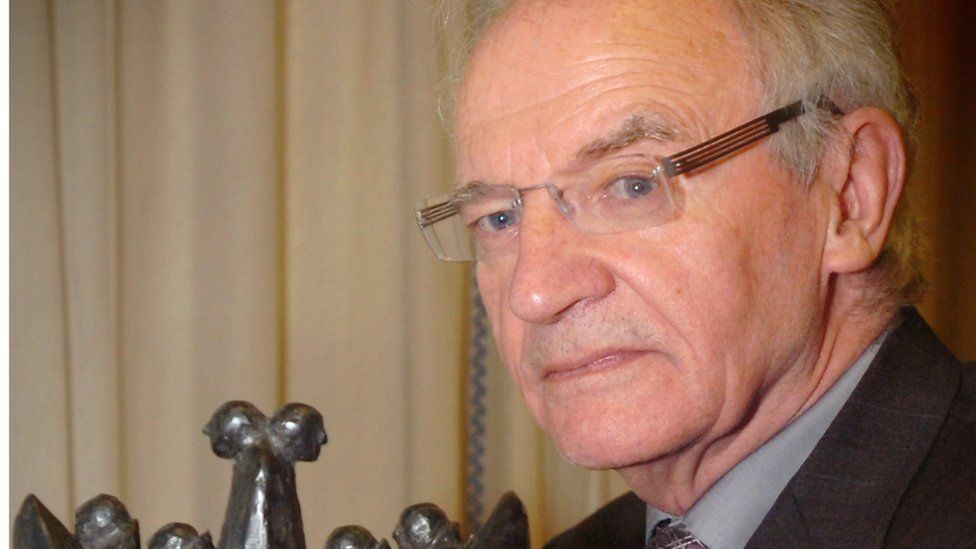Seamus Deane: Derry-born author and poet dies
- Published

The Irish Arts Council said Seamus Deane leaves behind a "powerful literary and cultural legacy".
The author and poet Seamus Deane has died aged 81.
Deane, an original member of the Field Day Theatre Company from Londonderry, died in hospital on 12 May.
President of Ireland Michael D. Higgins said his death would be "an incalculable loss to Irish writing".
His debut novel Reading in the Dark was shortlisted for the Booker Prize and won The Irish Times International Fiction Prize and The Irish Literature Prize in 1997.
In a statement, Mr Higgins said Deane was a "distinguished poet, novelist and internationally acclaimed university teacher".
"To Derry he leaves the incomparable legacy of the life, the writing, the concerns, the despair and the hope, that he shared with its people and to which so much of the work would respond," said Mr Higgins.
"Few cities have a writer more embedded in its people, its history, its challenges, its hopes and its humour," he added.
"There are, to me, parallels between Seamus Deane's relationship to Derry and, in his time, Sean O'Casey's relationship to Dublin in the way the full experience of its peoples are placed at the centre of the writing.
Prof Kevin Rafter, chair of the Irish Arts Council, said Deane left a "powerful literary and cultural legacy".
Allow Twitter content?
This article contains content provided by Twitter. We ask for your permission before anything is loaded, as they may be using cookies and other technologies. You may want to read Twitter’s cookie policy, external and privacy policy, external before accepting. To view this content choose ‘accept and continue’.
"As a critic, an editor, a poet and a novelist, Deane brought concentrated rigour and empathy to his work," Prof Rafter said.
"A gifted writer and a profound intellect, Seamus Deane was a master of every writing form".
Prof Rafter said Deane was also an "inspiring teacher and continual advocate for Irish writing".
'Rising expectation of the Catholic community'
He was educated at St Columb's College in Derry, where he was a classmate of Nobel laureate Seamus Heaney.
Civil rights campaigner Eamonn McCann, also a schoolboy contemporary of Deane's at St Columb's College, told BBC Radio Foyle he was a "literary giant".
"And I knew him at Queen's University when he was beginning to emerge as a huge literary talent.
"I had huge respect for him as a writer and I also liked him very much as a human being."
Mr McCann said Deane was an "apt example" of the talent coming out of the school at the time.
"I think it had something to do with the rising expectation of the Catholic community and the growing and huge self-confidence of the people who came out of St Columb's," he said.
Fifty years at the centre of Irish writing
Like his friend and classmate Seamus Heaney, Seamus Deane made the journey from St Columb's College to Queen's University to global renown.
Along with Heaney, Stephen Rea, Brian Friel and others, he was one of the driving forces behind the Field Day organisation.
The company's first production was Friel's ground-breaking play Translations, staged first in September 1980 in the Guildhall in Derry.
Deane was a prominent poet and critic and later took on the monumental task of editing the 4,000-page Field Day Anthology of Irish Writing, the first volumes of which were published in 1990.
But it was his Booker-shortlisted 1996 novel Reading in the Dark - based on his childhood in Derry - which brought him wider public acclaim.
Seamus Deane's passing comes after half a century at the centre of Irish writing.
After leaving Derry, Deane studied at Queen's University Belfast, Ulster University and Cambridge University.
A career in academia saw him lecture at University College Dublin and later become professor at the Keough-Naughton Institute for Irish Studies at the University of Notre Dame, Indiana, in the United States.
His poetry include the collection Gradual Wars, which won the AE Memorial Prize.
- Published20 July 2010